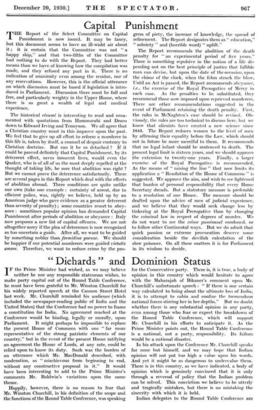Capital Punishment
THE Report of the Select Committee on Capital Punishment is now issued. It may be fancy, but this document seems to have an ill-wisht air about it ; it is certain that the Committee was not " a happy ship," and that two-fifths of the Committee had nothing to do with the Report. They had better means than we have of knowing how the compilation was made, and they refused any part in it. There is no indication of unanimity even among the residue, nor of any reservations. However, this is the official utterance on which discussion must be based if legislation is intro- duced in Parliament. Discussion there must be full and free, and particularly weighty in the Upper House, where there is so great a wealth of legal and medical experience.
The historical resume is interesting to read and orna- mented with quotations from Hammurabi and Draco down to Edward Irving and Tennyson. We all agree that a Christian country must in this improve upon the past. We feel that to give up all effort to reform a murderer in this life is, taken by itself, a counsel of despair contrary to Christian doctrine. But can it be so detached ? If it could be proved definitely that Capital Punishment, by its deterrent effect, saves innocent lives, would even the Quaker, who is of all of us the most deeply repelled at the thought of taking life, be sure that abolition was right ? But we cannot prove the deterrence satisfactorily. There are several pages in this Report which deal with the effects of abolition abroad. There conditions are quite unlike our own (take one example : certainty of arrest, due to efficient police, was, rightly we believe, held up by an American judge who gave evidence as a greater deterrent than severity of penalty) ; some countries resort to abey- ance : sometimes popular opinion has demanded Capital Punishment after periods of abolition or abeyance : Italy now proposes a new list of capital offences. We are not altogether sorry if the plea of deterrence is now recognized as too uncertain a guide. After all, we want to be guided by something nobler than formidine poenae. We should be happier if our potential murderers were guided virtutis amore. Therefore, we want to reduce crime by the pro-
gress of piety, the increase of knowledge, the spread of refinement. The Report designates them as " education," " sobriety " and (horrible word) " uplift."
The Report recommends the abolition of the death penalty for " an experimental period of five years."
There is something repulsive in the notion of a life de- pending not on the best principle of justice that fallible man can devise, but upon the date of the occasion, upon the chime of the clock, when the felon struck the blow. Until an Act is passed, the Report recommends abeyance, i.e., the exercise of the Royal Prerogative of Mercy in each case. As the penalties to be substituted, they recommend those now imposed upon reprieved murderers. There are other recommendations suggested in the event of Parliament retaining the death penalty. First, the rules in MeNaghten's case should be revised. Ob- viously, the rules are too technical to discuss here, but we know that alicnists have created a new science since 1813. The Report reduces women to the level of men by affirming their equality before the Law, which should not in future be more merciful to them. It recommends that no legal infant should be sentenced to death. The present legal limit is sixteen years, and we should approve the extension to twenty-one years. Finally, a larger exercise of the Royal Prerogative is recommended. As the means of " raising the line " that now limits its application a " Resolution of the House of Commons " is suggested. We approve the aim, and wish to see lightened that burden of personal responsibility that every Home Secretary dreads. But a statutory measure is preferable to a resolution of one House. The measure should be drafted upon the advice of men of judicial experience, and we believe that they would seek change less by tinkering at the Royal Prerogative than by changing the criminal law in respect of degrees of murder. We do not want to see the crime passionnel condoned, or to follow other Continental ways. But we do admit that quick passion or extreme provocation deserve sonic consideration beside the devilish calculation of the slow poisoner. On all these matters it is for Parliament in its wisdom to decide.






































 Previous page
Previous page